Geothermal energy — energy right beneath our feet ― has an enormous potential with a proven reliability to meet heating, cooling and flexible electricity generation demands. With a low carbon footprint, this largely untapped natural and renewable energy resource has the capacity for a sustainable and clean energy future.
Despite the power generating opportunities offered, exploitation of geothermal resources continues to remain a challenge relative to the conventional sources, often due to the high investment and operational costs of geothermal power plants. These issues stem from the techno-economic and environmental impacts of drilling wells to geothermal reservoirs, component failure due to the uncertainty of geothermal formations, including high reservoir temperatures, and the aggressive nature of geofluids.
Building on its expertise and knowledge in coatings, material properties and performance, plant management, and joining technologies, TWI pioneers geothermal energy research by providing solutions to help improve flexibility and efficiency of geothermal systems, while reducing plant operational costs, including provision of holistic approaches for cheap and efficient drilling solutions.
TWI is working on a number of geothermal power projects, these include:
GeoCoat: Developing Next Generation Coatings for Geothermal Power Plant
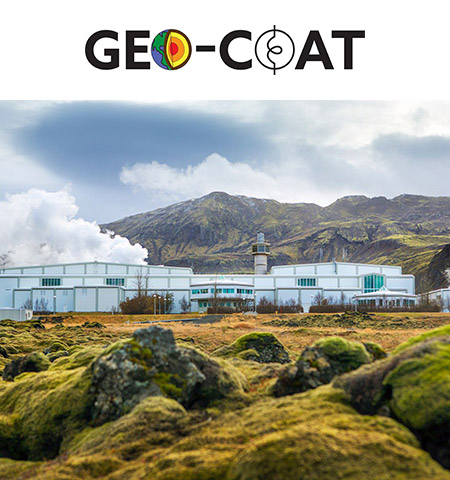 Led by TWI, the project aims to develop novel high performance, specialised corrosion- and erosion-resistant coatings for exceptionally harsh environments. These high performance corrosion and erosion resistant coatings are based on selected high entropy alloys (HEAs) and ceramic/metal mixtures (Cermets) to be applied through high velocity oxy fuel (HVOF) thermal spray, electro spark deposition (ESD), electroless plating, and laser cladding.
Led by TWI, the project aims to develop novel high performance, specialised corrosion- and erosion-resistant coatings for exceptionally harsh environments. These high performance corrosion and erosion resistant coatings are based on selected high entropy alloys (HEAs) and ceramic/metal mixtures (Cermets) to be applied through high velocity oxy fuel (HVOF) thermal spray, electro spark deposition (ESD), electroless plating, and laser cladding.
Although originally designed to target the key failure points within geothermal power plants, the coatings developed have cross sector benefits and can potentially be applied to other sectors, such as glass, paper, oil and gas, food and drink, etc.
Geo-Drill: Holistic Drilling Solutions for Cheaper Geothermal Power
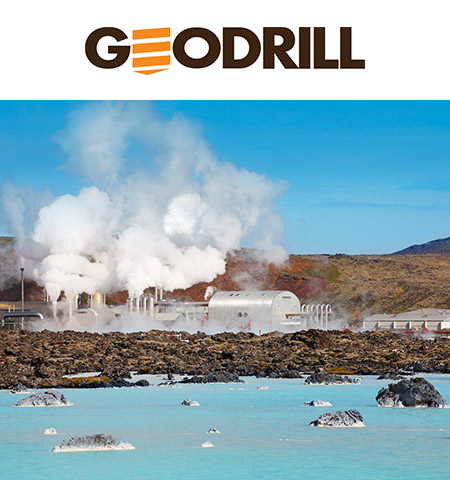 The project aims to reduce the high costs associated with drilling by addressing the materials challenges associated with the wear and fracture of drilling components. The Geo-Drill concept is based on three technology pillars:
The project aims to reduce the high costs associated with drilling by addressing the materials challenges associated with the wear and fracture of drilling components. The Geo-Drill concept is based on three technology pillars:
- Reduced drilling cost through hydraulic DownTheHolefluid/mud hammer
- Advanced drill monitoring through low-cost and robust 3D printed sensors
- Improved component life through advanced materials and coatings
The strength of these technologies will be combined to meet the unified objective of developing novel drilling technologies that will significantly reduce the cost of deep geothermal drilling, with a targeted depth of 5 km and high temperatures of 250°C and above.
GeoSmart: Towards Flexible and Efficient Geothermal Systems
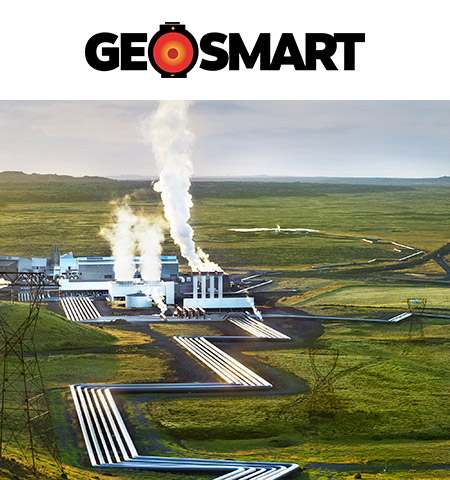 Geothermal energy is currently engineered as an "always on" baseload supply in power generation, due to the limited flexibility to throttle the well without scaling and liner fatigue problems, and is engineered for maximal efficiency at this output level. Project GeoSmart, aims to address the strategic flexibility required from European geothermal installations, as they become significant energy sources over the next 20-30 years, replacing decommissioned fossil fuel plants.
Geothermal energy is currently engineered as an "always on" baseload supply in power generation, due to the limited flexibility to throttle the well without scaling and liner fatigue problems, and is engineered for maximal efficiency at this output level. Project GeoSmart, aims to address the strategic flexibility required from European geothermal installations, as they become significant energy sources over the next 20-30 years, replacing decommissioned fossil fuel plants.
GeoSmart aims to optimise and demonstrate innovations to improve the flexibility and efficiency of geothermal heat and power systems, by developing a suite of equipment and tools including:
- Energy storage and power block management innovations to provide daily flexibility
- Integration of more flexible Organic Rankine Cycle (ORC) systems that can cope with variations in needs in the electricity markets
- Combined Heat and Power (CHP) supplier to extract more heat from the post-generator ("waste" heat) brine outflows when required for increased heating supply during colder weather
GeoHEX: Developing High Performance Heat Exchangers for Geothermal Energy
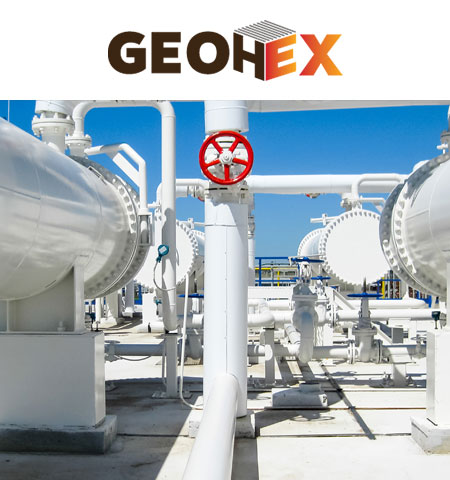 GeoHex relies on the use low cost carbon steel as base material for heat exchangers. Through modification of the surfaces with nano porous coatings and controlling the surface chemistry, GeoHex aims to significantly improve the heat transfer performance of single phase and phase change heat transfer process respectively. The project relies on the use of Ni-P/Ni-P-PTFE duplex and amorphous metal glass coatings to attribute the anti-scaling and anti-corrosion properties to the low-cost carbon steel substrate.
GeoHex relies on the use low cost carbon steel as base material for heat exchangers. Through modification of the surfaces with nano porous coatings and controlling the surface chemistry, GeoHex aims to significantly improve the heat transfer performance of single phase and phase change heat transfer process respectively. The project relies on the use of Ni-P/Ni-P-PTFE duplex and amorphous metal glass coatings to attribute the anti-scaling and anti-corrosion properties to the low-cost carbon steel substrate.
GEOPRO: Understanding and Modelling Geofluid Characteristics
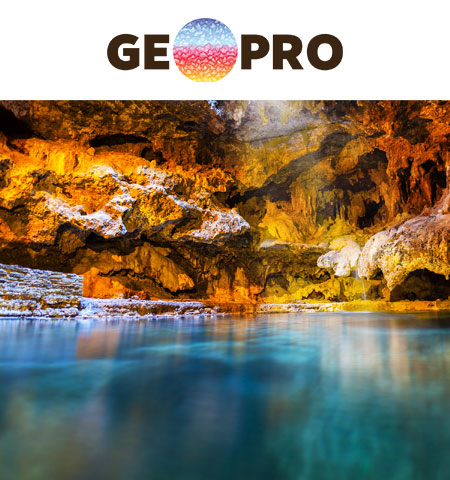 The chemical and physical properties of the geothermal fluids are crucial in exploration, prediction and utilisation of novel geothermal technologies. An improved understanding of the properties of these fluids is considered important to optimise site developments and operation of geothermal systems. Project GEOPRO, is designed to generate targeted advances in the understanding and modelling of geofluid characteristics, to support geothermal users by:
The chemical and physical properties of the geothermal fluids are crucial in exploration, prediction and utilisation of novel geothermal technologies. An improved understanding of the properties of these fluids is considered important to optimise site developments and operation of geothermal systems. Project GEOPRO, is designed to generate targeted advances in the understanding and modelling of geofluid characteristics, to support geothermal users by:
- Supporting improved design efficiency – knowledge-based design of wellbore, pipework, heat exchangers;
- For optimal conversion of the primary energy into electrical power;
- Enabling knowledge-based design activities for best control of the constraining fluid phenomena (such as scale formation, outgassing, cavitation during changes in temperature and pressure), maximising uptime and operational effectiveness of the plant;
- Providing underpinning knowledge for the future exploration and exploitation of supercritical systems through improved “vectors to ore” arising from the ability to better use fluid chemistry to predict deep subterranean conditions.
S4CE: A Well-established Interdisciplinary Network of Scientists to Trust the Environmental Safety of Geo-energy Operations
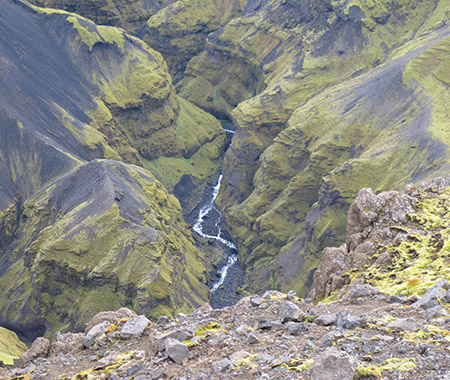 The Horizon 2020 project S4CE aims to develop, test and implement technologies needed for successfully detecting, quantifying and mitigating the risks connected with geo-energy operations in the sub-surface.
The Horizon 2020 project S4CE aims to develop, test and implement technologies needed for successfully detecting, quantifying and mitigating the risks connected with geo-energy operations in the sub-surface.
The project, which is led by UCL, includes 23 partners representing academic institutions, industry energy operators, industrial partners and research institutes.
S4CE’s ambition is to develop and implement state-of-the-art technologies to assess the environmental footprint of geo-energy sub-surface operations in EU. The project promotes the benefits of a multi-sensor approach in managing sub-surface operations.
The project is deploying advanced instrumentation in three existing field sites in Europe; the CarbFix site in Iceland, one geothermal operation in Cornwall and a water-gas well in St. Gallen, Switzerland.
TWI is leading work related to the implementation of novel technologies in these three European field sites.